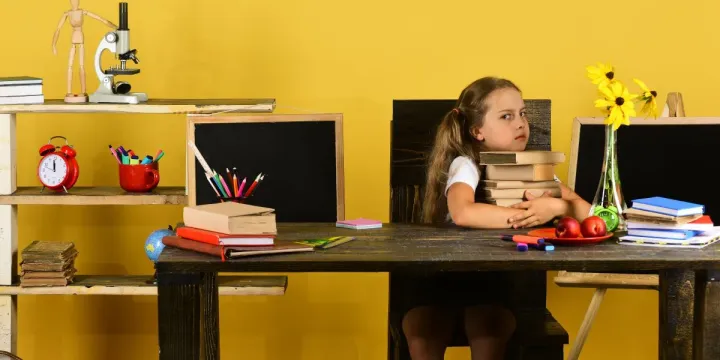It’s not so easy for kids today to focus on studying for long periods of time. With so much interesting content over the net, they can find distractions at arm’s length. On the other hand, their future depends on the efforts they make during their adolescence. That’s why worried parents often want to know how to increase focus while studying so that they can help their children.
It was not the same in our time before smartphones came. I remember wanting to go outside and play with my friends. But hanging out with friends wasn’t possible until I’ve gotten some work done. Fortunately, I was done studying when smartphones came and I didn’t have to deal with so much distraction. But let’s take a look at ways that we can help our kids focus better on their studies despite all the distractions.
How to Improve Concentration and Memory While Studying
Here are 12 tips on how to increase concentration while studying to implement into your child’s routine:
Have a Planned Studying Schedule
It’s important to set a predefined schedule for your child’s study hours. This helps train the brain to function more efficiently at certain hours. This can also help them plan for their other activities throughout the day more easily. However, the results may vary among different individuals. A study conducted at the Louisiana State University shows that having a practice schedule can have a better effect on low-skilled students than on students with higher-level skills.
Consider a Healthy Diet
A healthy diet rich in nutrients is essential for your child’s physical and mental well-being. Make sure that your child is having a balanced diet, and gets enough protein and vegetables every day. Your child shouldn’t skip any of their meals, as their body and mind are developing. Breakfast is one of the most important meals of the day. A study conducted at theUniversity of Leeds shows that having breakfast can positively affect academic productivity. Read our blog about drinks that will help your child focus on studying.
Talk to Them About What They’ve Learnt
Sometimes when you study, you feel like you’ve learned the lesson completely. But when you think back on it, you realize that everything has skipped your mind. Repeating what you’ve studied helps it to stick in your mind more easily. So, the next time they’re telling you about what they’ve learned today while you’re watching the news, try to listen to them and participate in the discussion.
Take Notes
Just like the tip above, taking notes can make the subject clearer for your kid. It can also prevent the mind from jumping to irrelevant subjects. Consider buying them a notepad they enjoy using and getting them to take colorful notes of important parts of the lesson they’re studying.
Turn the Volume Down
It’s gotten really hard to focus on studying in this day and time. For instance, watching your child’s favorite TV show when they’re trying to study in the other room can really make the process hard and unpleasant for them. The same goes for any other sounds that can distract them. Be mindful of their studying schedule and try to keep the house quiet during these times. Try to make them feel like they’re not missing out on anything.
Choose a Designated Place Just for Studying
Make sure that your child doesn’t choose their study location randomly. Having a special place just for studying will train your child’s brain to go into study mode as soon as they go there. I used to study on my bed and it never went well. I always ended up falling asleep after 30 minutes. Those were the deepest sweetest sleeps I had, but they were no good for my grades.
If no such space is available at your house, consider signing them up in a library. Libraries are a great place for concentrating. Seeing so many people just focusing on their job will encourage your child to do the same.
Put Their Phone in Another Room
Sometimes, it’s the physical presence of a phone, or any other potential distraction, that prevents your child from studying continuously. So, if the object is no longer in front of their eyes, it will make it harder for them to pick it up and use it. Now, we don’t mean that you confiscate it by force. But just talk to them about the benefits of doing so, and instead of keeping the phone yourself, put it in a drawer. This will free their mind from worrying that you are looking at their phone and reading their messages.
Study with Them
Teamwork is almost always more effective. If you have the time, sit down with them and engage with their studying. This way, it’ll get more fun for them and you can keep track of their level and progress.
However, if you’re too busy, consider having them study with friends or study groups. But pay attention to how they’re spending that time together.
Make It Rhyme!
If your kid constantly complains about forgetting stuff they’ve studied, you can make or look simple jingles up that will stick to the mind because they’re catchy and they rhyme. Look at this example:
Six and seven live in a shoe; it must be size forty-two

Give Them Breaks
A child’s mind needs to take breaks from studying to function better. See how long your child can focus before they phase out and give them breaks accordingly. During the break, let them rest and do stuff that they like. However, these activities shouldn’t be so stimulating that it will be hard for them to get back to studying.
Turn Off Phone Notifications
Ask them to put their phone on “Do not disturb” mode when they’re studying. If they don’t hear their phone buzz every two minutes, their mind will be less involved in thinking that something important has happened that they’re unaware of.

Use Parental Control Apps
Sometimes, the reason why your child is so distracted is that they’ve become too dependent on their electronic devices. As a widespread recent problem, screen addiction needs to be taken seriously. Read our blog on how to prevent your child from screen addiction.
The ultimate solution when your child is too stubborn to put the phone aside is to use parental control apps. Safes is one of the best parental control apps that will help you get personalized reports of your child’s online activity. You can restrict their access to certain apps during their study hours and in certain locations. In addition to its reasonable price, it’s really easy to install and use.
Conclusion
Every child is different. And so are the reasons why they can’t focus. However, these 12 tips on how to increase focus while studying are useful tricks to help them manage their studying hours more efficiently. Remember, this isn’t a game of power, but a friendly cooperation.

